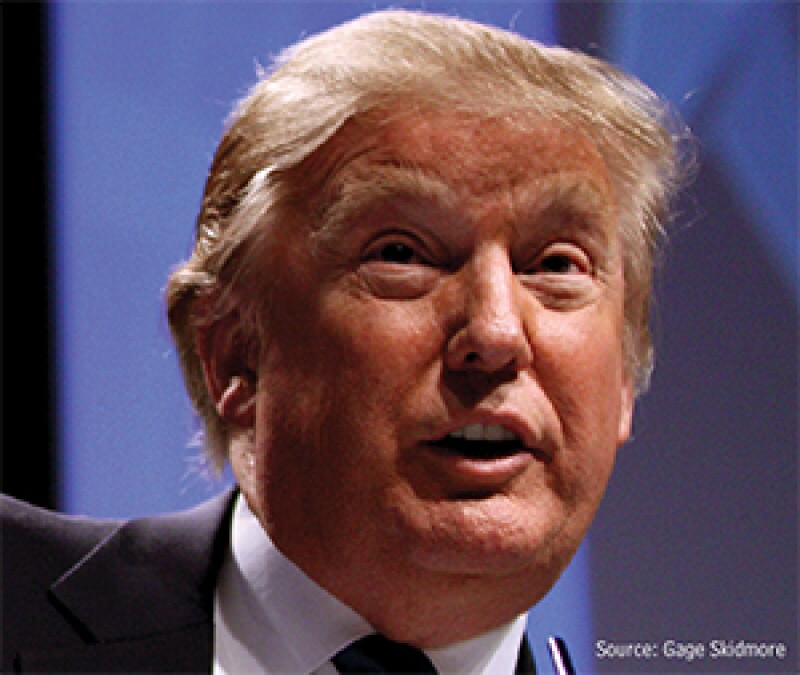
|
Donald Trump was also in the Global Tax 50 2016 |
President Donald Trump came to office in January 2017 promising to overhaul the US tax system in his first year. It was an ambitious project for any president, yet it was not inconceivable that the new administration would be able to draw up a plan and rush it through Congress.
But Trump's efforts on taxation are not the only reason he made the Global Tax 50 list for the second year running. No US president has been as vocal about his opinions on social media as Trump, with tweets about the tax affairs of some multinationals, his tax returns and his opinion of how the media talk about tax matters and dissect his business affairs.
The US tax reform bill (see page 57) has made up a large part of his recent tax tweets, however. It proposes a host of measures, most notably the reduction of the corporate tax rate from 35% to 20% and making the move towards a territorial tax system. These reforms will not just overturn the US tax code, they could well shift the centre of gravity on international tax and will reinforce the race to the bottom around the world.
The rest of the plan fits with Trump's 'America First' rhetoric. The repatriation of deferred foreign earnings will benefit from a 12% tax on foreign-held cash and cash-equivalent profits returned to the US. Meanwhile, payments made by US companies to foreign affiliates will face a 20% excise tax. The idea being to re-privilege American business and goods above the competition.
In theory, the Trump administration should have found it easy to implement its tax plans. The Republican Party control both the Senate and the House of Representatives, but, at the same time, the party has been wracked by divisions over the tax plans, healthcare reform and even the president himself. So the lack of unity substituted for a strong opposition in Congress.
Even without the infighting, it would have been difficult to push through the tax reform and see it implemented within the first year of the new administration. On the campaign trail, Trump talked up slashing the corporate rate to 15%, dropping a border tax on foreign goods, while establishing a territorial tax system with a one-time 10% rate for repatriated profits.
In the end, the tax reform bill represents a diluted form of what Trump talked about during the campaign. The corporate rate of 15% became 20% and the 10% became 12% for repatriated profits, while the border tax has been dropped. But the impact of these changes will still be dramatic in a once stable world.
Starve the beast
One of the big questions about the Trump tax plan is how the US government will fund these generous cuts, given the country's mountain of debt. Unsurprisingly, Trump's proposals divide Republicans on the issue of reducing the deficit.
Early on in his term, Trump declared his intention to cut public spending by $10 trillion. Much like the tax pledge, this number was eventually ratcheted down to $3.6 trillion in spending cuts – taking aim at health and welfare programmes. Yet the Trump plan includes boosting military spending, which has long been the biggest proportion of the US budget.
If history is anything to go by, the US has been in this situation before. The Reagan administration cut the top rate of income tax from 70% to 28% while it continued to spend enormous amounts of public money on defence. Yet the idea was that the tax cuts would force the federal government to tighten its belt sooner rather than later.
The proponents of this fiscal strategy described it as "starving the beast". What actually happened was that the tax cuts created vast deficits, which were left for future administrations to pay off. It's what led George HW Bush to famously betray his "no new taxes" promise, clearing the way for a great deal of belt-tightening in the Clinton years.
The second Bush administration made short work of the surplus they inherited from Bill Clinton and ordered a fresh round of measures to lower taxes. The lower rates cost $1.5 trillion over 10 years, before they were extended in a modified form by President Obama in 2012. The Joint Committee on Taxation forecast losses to the US Treasury of $1 trillion over the next decade as a direct result of these tax reforms.
The first year of the Trump administration has lived up to the president's reputation for being unpredictable and 2018 will no doubt bring further surprises.
The Global Tax 50 2017 |
|
|---|---|
The top 10 • Ranked in order of influence |
|
6. Arun Jaitley |
|
The remaining 40 • In alphabetic order |
|
| The Estonian presidency of the Council of the European Union |
|
| International Consortium of Investigative Journalists (ICIJ) |
|
| United Nations Committee of Experts on International Cooperation in Tax Matters |
|









